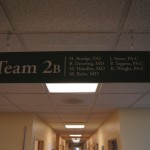The words in the title of this post are the question Barbara Detering, MD, who is a family physician, at Group Health Cooperative Family Health Center and physician leader for Group Health Cooperative ( @GroupHealth) in Seattle, Washington, asked one of her patients who came in to see her.
Photographs, below, click to enlarge:
The result of GroupHealth’s re-invention of primary care, as they call it (they blog about it here, you can see a video clip about it here) is that primary care physicians ask this question, and then they take the time to listen to the answer.
In addition, when a patient and their family comes in after having done research on the internet, she reads the information and uses it to direct patients to web sites that are as helpful as possible, rather than rejecting the desire to be informed. Barbara says:
“You can be right or in a relationship.”
I am maybe just a little biased because I trained here, and Barbara helped train me :), however, this is the family medicine that I am drawn to. It’s the kind of family medicine where taking a history comes from the patient and families’ own words, not from a series of tests that you order. Here, the words of the patient may be sent in advance, through secure e-mail.
More than once I heard Barbara say, “I read the e-mail you wrote me,” in addition to, “I reviewed your medical record this morning.” She told me that these simple statements put patients at ease in a doctor visit. They say, “I used my time to save your time,” and I could see how they reduce anxiety.
After that, she gets to be a great family doctor. She sees children and teens who she actually delivered – she knows families and relates their experience today to their relationship together and her relationship to other families in her practice. And remember, this is not rural Vermont, this is high-tech downtown Seattle.
Barbara told me that about half of the health care she delivers is done virtually, through secure e-mail and the telephone. She estimates the number is about 30 % across GroupHealth. She showed me her schedule for the day – 2 in person visits an hour, staggered with 1 block of time to deliver virtual care plus population care. This averages to about 7 in person visits in a half day.
If you’re a primary care physician in the rest of the world, where the norm can be as high as 12-15 in person visits in a half day, you know this is futuristic. And you also know that a request that you deliver virtual care on top of this is probably not going to be warmly received.
In the afternoon, I shadowed David Kauff, MD, who’s an internist at Group Health Downtown Medical Center and also the Medical Director for Practice and Leadership Development for GroupHealth. Again my bias is showing, it has made a huge impact on my life to be a part of a medical group where physician leadership is valued and important.
David’s practice style is a little bit different than Barbara’s, and no less engaging to his patients. He tells me he works to make whatever he is doing feel fun, and when it feels fun, it is fun. I asked him whether it has been easier for him to do this in the era of medical home and he says “yes.” “I couldn’t do as much of what I do before.”
An internist usually takes care of a different spectrum of patients than a family medicine specialist does, so being the family doctor that I am, I am impressed with the level of complexity that he manages. David tries to draw me into the visit, which I resist (the shadower doesn’t like to come out of the shadows :)), so instead he talks to me about what he’s seeing and what he thinks of each case he is in between patients. I know why David’s in charge of leadership development, teaching comes naturally to him, he makes me feel as if I know as much as he does (which is most definitely not the case).
The issues he deals with are quite serious and thought provoking, I would say no less so than Barbara’s are – they are both supporting patients and families who can be (a) hurt (b) worried and/or (c) terrified by the things that bring them to see the doctor. When the patient is worried, the doctor is worried, too. The primary care system gives them the space and time to be worried about their patients.
David and Downtown Medical Center Manager Gillian Gallo showed me the wall of measures prominently displayed on the wall (obviously), which is a product of GroupHealth’s transformation using LEAN (see this post about that). It allows Gillian to walk anyone through the meaning of this work, how improved call handling, or secure message work saves a member/patient time and the system money and capacity, so that physicians and nurses can have the time and information to be there for their patients, patients can be successful in their home, work, and play.
My day ended with a gorgeous walking meeting with Gwen O’Keefe, MD, who is the Chief Medical Information Officer here. As I posted recently, GroupHealth is part of the Care Connectivity Consortium, that is going to engineer the secure exchange of electronic health data among the United States’ leading health care organizations.
Gwen tells me that Group Health is already live, and using, secure health information exchange with users of the EpicCare electronic health record system across the United States.
The system allows a physician to obtain consent from a patient in the exam room and then instantly query over 100 different medical record systems for needed information at the point of care. Now that GroupHealth has made using this technology a reality, Gwen told me they are now learning as much as they can about patient preferences and the best way to respect them in encounters. They are past the theoretical.
At the same time, like many other health systems around the United States, Gwen is leading the work to meet Meaningful Use requirements for electronic medical records. As a national leader in health information technology, its understandable that GroupHealth is going to do a great job AND be a good community citizen in doing the necessary work.
Because I am in Seattle this week spending time with physician communicators who use social media ( led by the amazing @seattlemamadoc ), it was great to come back where I started, to see how primary care can be adapted and advanced, with health information technology as an enabler.
No one told me that their journey was complete, or that they had fully realized the vision in every medical office. However, I could tell that they have a good sense of what their patients expect of the relationships and that they intend to meet those expectations. As Barbara said, it’s not about being right….
Thanks again to the awesome members, staff, nurses, and doctors at GroupHealth for their time, energy, innovation, and teaching. I’m glad I met you, and look forward to coming back again.











7 Comments
RT @tedeytan: Post: “Tell me your story” : A day in the medical homes of @GroupHealth Cooperative, Seattle http://teyt.in/f3rE2h
RT @tedeytan “Tell me your story” : A day in the medical homes of @GroupHealth Cooperative, Seattle http://hisoc.us/dRI84m
MD to pt: "I read your email…" RT @tedeytan: Post: “Tell me your story” : A day in med homes @GroupHealth, Seattle http://teyt.in/f3rE2h
This is just the coolest thing. Group Health is a very special place to work — and those of us on the IT side working behind the scenes supporting our EMR still recognize that we do what we do for our patients — the goals and mission of Group Health are clear and guide our work every day.
Ted,
Great to hear you were "home" again. Sorry to miss your visit. Was on a 3 month sabbatical.
Back on Monday.
You failed to mention a wonderful link, that Barbara and David are marital partners, raising kids.
Sure hope the Dems can pull it off again (re presidential) in 2012, and that you can maintain your bully pulpit in DC for the good guys in health care.
Keep up the good work.
All the best to you.
Travis
[…] – Tell Me Your Story: A Day in the Medical Homes of Group Health Cooperative, Seattle […]
Dear Kim and Travis,
Thanks for stopping by to take a look and celebrate what you've accomplished. It is very impressive.
And Travis, I thought I'd leave it up to the audience to mention the connection between David and Barbara, which you have now done. I reflected to David how interesting it was that I had done something in their relationship that they had not – watched each other practice, it was even more humbling than it usually is when I am given the gift of watching a clinician care for another person.
Sorry I missed you, I will look forward to seeing you on a future trip, as a yet-another-great-example-of-what-a-family-physician-can-be – welcome back to health care,
Ted